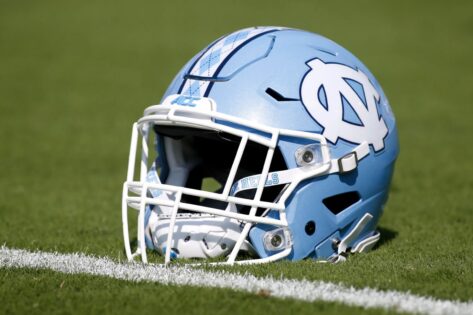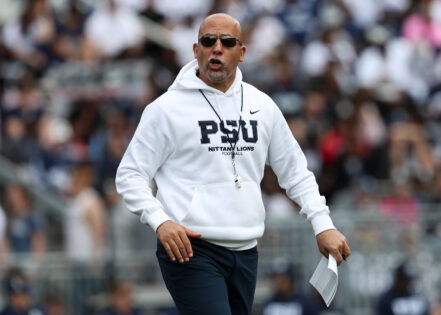It was snuck like a perfectly timed screen pass, and now it’s law. While the world was busy watching the summer recruitment heat soar, North Carolina lawmakers were quietly pulling a legal punch of their own. House Bill 378, passed unanimously by the General Assembly and signed by Gov. Josh Stein on Tuesday without a whisper of comment, rewrites the NIL game in the Tar Heel State. And not just for athletes, it changes the rules of agents, schools, and the public’s right to know who’s cashing in.
On July 2, Darren Heitner posted the latest North Carolina NIL law on X. “North Carolina’s governor has signed a bill into law that includes a public records exemption for #NIL contracts,” he wrote. And just like that, a new clause tucked inside General Statute 132-1.2 made it official. The attached picture of the bill featured the Part VIII headlined Public Records Exemption for Certain Name, Image, and Likeness Contracts.
Under Confidential information, it’s written, “Nothing in this Chapter shall be construed to require it authorize a public agency or its subdivision to disclose any information that: Reveals records related to a student athlete’s name, image, and likeness contract.” That means the public, including media and watchdogs, won’t see how NIL money flows through state-funded institutions.
North Carolina’s governor has signed a bill into law that includes a public records exemption for #NIL contracts. Here’s the specific language: pic.twitter.com/d8rNfTEiaL
— Darren Heitner (@DarrenHeitner) July 2, 2025
Even more eyebrow-raising is that this exemption applies retroactively. Lawmakers added the wording two months after they filed the bill, catching even legal experts off guard. David McKenzie, local First Amendment and Intellectual Property attorney, wasn’t pulling punches. “It’s a way of taking the public records law and nibbling it to death like they are ducks,” he told The News&Observer. And his biggest gripe is the inconsistency. Coaches’ salaries are public. State employees’ compensation is public. But NIL earnings, often funded by donors or through university-adjacent collectives, now fall into a black hole. “I don’t believe it is a situation where FERPA applies,” he added.
FERPA, or the Family Educational Rights and Privacy Act, protects grades, disciplinary records, transcripts, and other academically-related records. “It was tacked on at the last minute [and] public resources, in the form of taxpayer money, are going to find these NIL deals, either directly or indirectly,” McKenzie said. The attorney firmly believed that the public needs to know about the value of these deals as they possibly going into millions of dollars. The legislation sailed through the statehouse 111-0, no opposition, nine lawmakers absent. But the silence around it, that’s where the noise should be.
The dawning of new athlete contracts and agent rules for North Carolina
This wasn’t just about shutting the blinds on public records. HB 378 also gave North Carolina’s NIL law a full-blown makeover, especially when it comes to how athlete agents operate. Also, what student-athletes must know before signing the dotted line. In a follow-up tweet, Darren Heitner added “North Carolina is now also 1 of the few states to update its sports agent law to account for #NIL’s role in college athletics. It distinguishes a pro sports services agency contract from an NIL agency contract and requires different language in each agreement.” As per the bill, a professional-sports-services agency contract comes with a warning if student-athletes sign the contract:
You shall lose your eligibility to compete as a student-athlete in your sport;
If you have an athletic director, within 72 hours after entering into this contract, both you and your athlete agent must notify your athletic director;
You waive your attorney-client privilege with respect to this contract and certain information related to it; and
You may cancel this contract within 14 days after signing it, cancellation of this contract shall not reinstate your eligibility.
Meanwhile, an NIL agency contract must come with a warning which states, “Entering into an NIL contract that conflicts with State law or your institution’s policies may have negative consequences, such as loss of athletic eligibility. You may cancel this NIL agency contract within 14 days after signing it.” As for agent rules, the leash just got a lot shorter. They must now:
Alert a student-athlete’s AD before the next game or within 72 hours of any deal;
Avoid giving gifts or misleading prospects;
Maintain five years of detailed records: names, addresses, contracts, and costs.
And if the state comes knocking? Those files better be ready. This isn’t just paperwork—this is a restructuring of power. With public access scaled back, agents held to higher scrutiny, and athletes caught in the middle, the NIL era in North Carolina just entered a new chapter. One with darker corners and higher stakes. The question now is who benefits from the silence.
The post What North Carolina’s New NIL Law Means for Public Records, Athlete Contracts, and Agent Rules appeared first on EssentiallySports.



